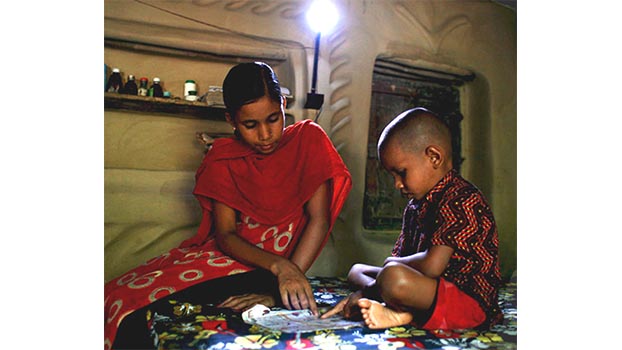Electricity changes rural lifestyle

The country's economic growth is progressing as a result of the supply of electricity.
Along with the increase in factory production, the lives of people in remote villages have also changed for the better. The shops and markets are open till midnight. Electricity has created new opportunities for people to earn, according to the power division.
Battery-powered vehicles have made transportation easier and cost effective in rural areas following electricity reaching there. Trading is on the rise. The use of irrigation electricity is increasing. Poultry and cattle farming have become easier. The uses of electronics equipment for home appliances are also increasing.
A Power Division official said, ‘Some 99 percent people of the country are now under electrification. The grid area will be fully electrified this December. Electrification in remote or off-grid areas is a bit behind, but it will be completed in March during the ‘Mujib Barsho’.
The shops closed earlier with the onset of evening because there would be no people in markets without electricity. But recently the situation has changed, people now shop at midnight in the markets.
The country's farmers are now using electricity instead of diesel to run irrigation machines. In 2009, there were 2 lakh 34 thousand electric irrigation pumps in the country. Now it stands at 3 lakh 62 thousand. Small entrepreneurs have created new types of employment due to the availability of electricity. People are changing their fortunes with rice threshing mills, poultry farms, welding machine factories etc.
State Minister for Power, Energy and Mineral Resources, Nasrul Hamid said people did not get electricity before, they faced load shedding for even up to 11 hours. But in the last few years, people's lives have changed as they have better access to electricity. There is no shortage of electricity now. Rather there is a surplus. And it has been possible due to the real-time sustainable planning and initiatives undertaken by the government of Prime Minister Sheikh Hasina. Now 99 percent of the people have access to electricity. We hope every house will get power supply by Mujib Barsho,” he said.
Nasrul Hamid said the demand of rural people is not high, they do not want cars like urban people. They just want a sustainable economy. The rural womenfolk who slept as soon as the sun set, are now sewing ‘Katha’ (quilts) till 9 pm. The shops and markets are open till midnight. Electricity has created new opportunities for people to earn. The dream of digital Bangladesh has come true due to the supply of electricity,” he continued.
When the Awami League-led government assumed office in 2009, the nation was suffering a chronic power supply crisis. Many industries, factories and business establishments shut their activities in the face of power outages and low voltage. Those days are now gone.
Bangladesh has now attained the capacity to generate around 22,885 megawatts of electricity. However, currently the demand is about 10,000 to 14,000MW. Bangladesh has now transformed from a power-shortage country into a power-surplus country.
In 2009, the average power demand at the time was about 6,000MW while power generation capacity of the country was less than 5000MW. Eight to ten hours load-shedding in summer days was causing unbearable miseries. Now the installed capacity has increased to 22,885 (with imported and renewable power). The number of power plants rose to 140 from 27. The number of electricity users increased from 1 crore 8 lakh to 3 crore 89 lakh. The transmission and distribution system losses have been significantly reduced to 8.73 percent during the incumbent government’s tenure, from 14.33 percent.
“There has been a lot of improvement in power generation in the country. Our generation capacity surpasses our demand. At this moment the government must pay attention to the transmission and distribution system to ensure uninterrupted power supply,” energy expert professor Dr Izaj Hossain told Bangladesh Post.
Engineer Mohammad Hossain, director general of Power Cell, told Bangladesh Post the government has achieved tremendous success in the power sector during the last decade.
“At that time we focused on power generation to meet the demands. We are now self-sufficient in power generation. Previously, severe load shedding disrupted people’s lives, factories’ production. But the problem no longer exists,” he said.
“We wanted a surplus in electricity generation and we succeeded. Now incidents like load shedding occur occasionally due to problems in transmission and distribution systems. So we are now focusing on improving the power distribution and transmission system,” he continued.
According to a study by research institute BIDS (Bangladesh Institute of Development Studies), an increase in power generation of 10 lakh units in Bangladesh also has an impact on the macro-economy, adding about taka 4.60 crore to 10 .70 crore to the economy.
According to BIDS research, the cost of electricity in a diesel-powered irrigation pump is Tk 47.18 per unit, whereas the cost of that for an electricity-run pump is taka 4 per unit.
‘Before 2010, the country spent around $100 crore a year on rice imports. Agricultural production has increased due to the provision of electricity in the irrigation system, now there is no need to import rice. In addition, the industrial and manufacturing sectors have grown due to the ability to ensure power supply. The number of small and medium industries has increased, said the BIDS study.




